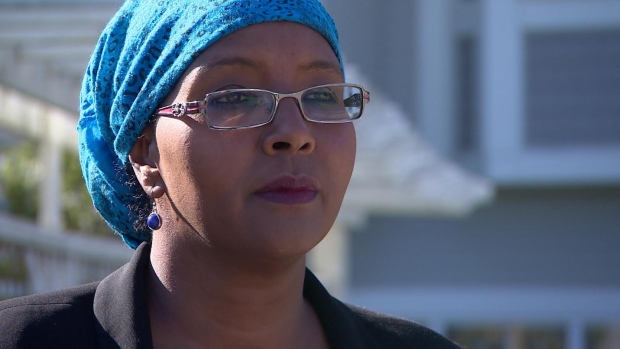
Friday September 25, 2015
By Andrea Huncar
Those helping immigrant women flee abusive relationships worry new government money won't help them

“A lot of women decide to stay, not because they want to stay in an abusive relationship but they stay because they have no place to go," says Habiba Abdulle who helps immigrant women leave abusive relationships. (Sam Martin/CBC)
A lack of shelters for large families is leaving some victims of domestic violence in dangerous situations, says an Edmonton outreach worker who helps refugees and immigrants.Habiba Abdulle said in one case when a mother of more than seven children finally worked up the courage to leave there was nowhere in Alberta for her to go."It was heartbreaking," said Abdulle, who works with the Alberta Somali Community Centre.
"This woman was so brave, so fed up, and she finally wanted to leave. But in the end when she made all those efforts to leave we couldn't find anywhere to put her."
Abdulle said the family was taken in by two local families, living apart for three months.
When they finally moved back into their own home after a restraining order was issued, it was not enough to keep them safe. The husband broke into their home and beat up his wife in front of the children.
"If she was in a safe place, she would not experience that," said Abdulle, who worries about the "long lasting impact on those children."
Abdulle was one of many who welcomed Wednesday's announcement by the province to provide $15 million in new funding to support women and children escaping domestic violence.
But she fears it will do little to improve circumstances for abused women she helps in local communities from East Africa and the Middle East, where new shelter space that accommodates larger families is "desperately needed."
Women stay because they have no place to go
Abdulle said it takes a lot for her clients to work up the courage to leave in the first place.
Many victims of violence face pressure from elders and others in the community to keep the family together. As newcomers, others do not have the language or work skills that would make it easier to leave.
In one case, with no shelter space available in Alberta "we had to buy a Greyhound ticket and ship her (a mother) and her children to Winnipeg," said Abdulle.
Sometimes she resorts to placing families in hotels, which can mean dividing them into two rooms.
"It's already hard for them to leave," said Abdulle. "And once they decide to leave, not having adequate services or a safe home makes their decision more difficult.
"A lot of women decide to stay — not because they want to stay in an abusive relationship -- but they stay because they have no place to go."
She said more outreach workers are needed from similar cultures to help abused women overcome the cultural barriers, and assure them that "in the end you're going to be OK."
She hopes the province will do more consultation with newcomer communities to understand their unique needs.
The Alberta Council of Women's Shelters said the new funding does not provide specific support to newcomers, but will improve services for all women they help.
Abdulle said she hopes some of the new money helps her clients. But there are success stories.
A year after one mother left an abusive situation, despite speaking little English, she is now fluent enough to hold down a steady job and mentor others in similar situations.
"That is exhilarating for us and for her. And she's very excited. The day that she got her driver's licence she came in and she said: 'Look at me -- I'm driving now.'
"And her kind of story is what motivates us. She's an example for a lot of other women."